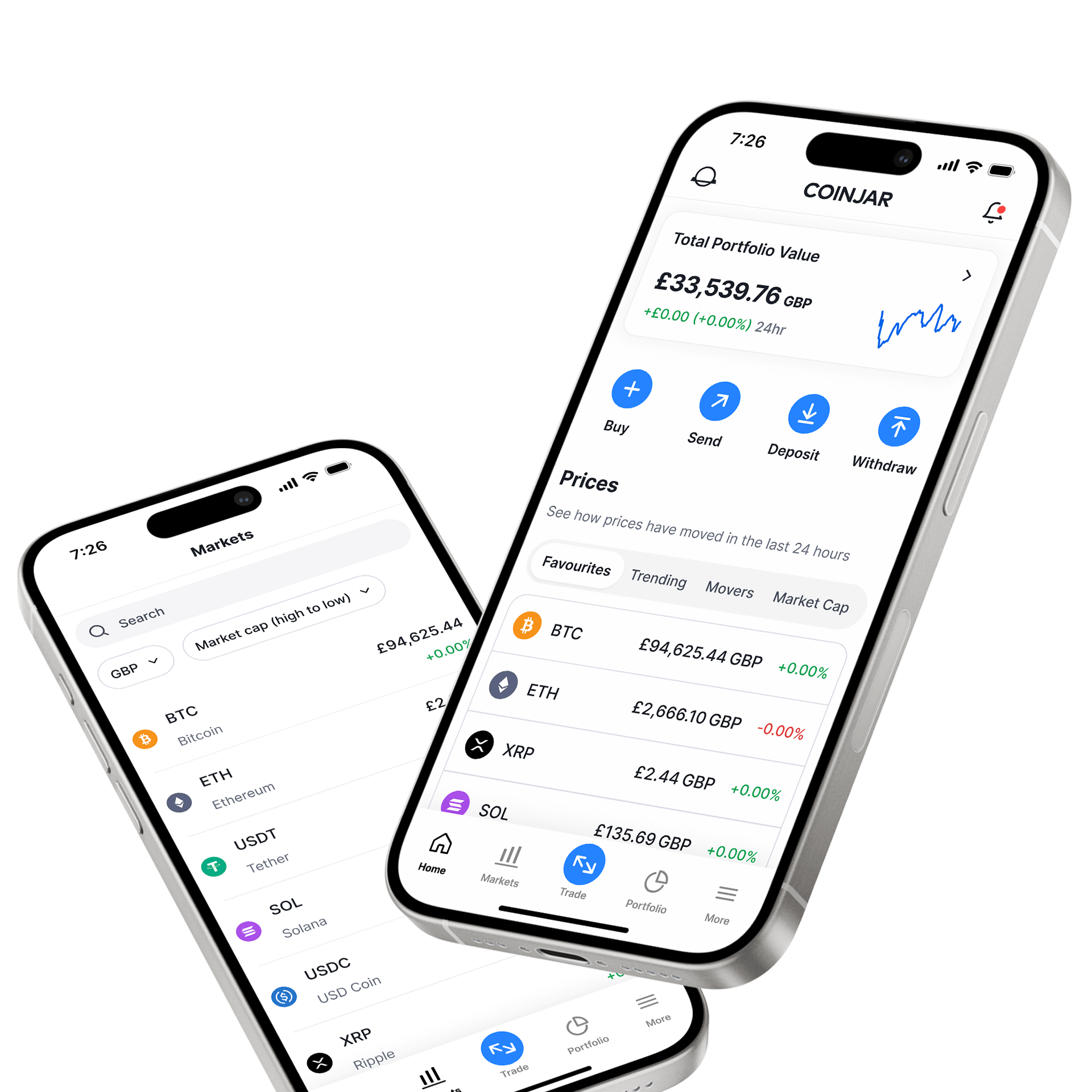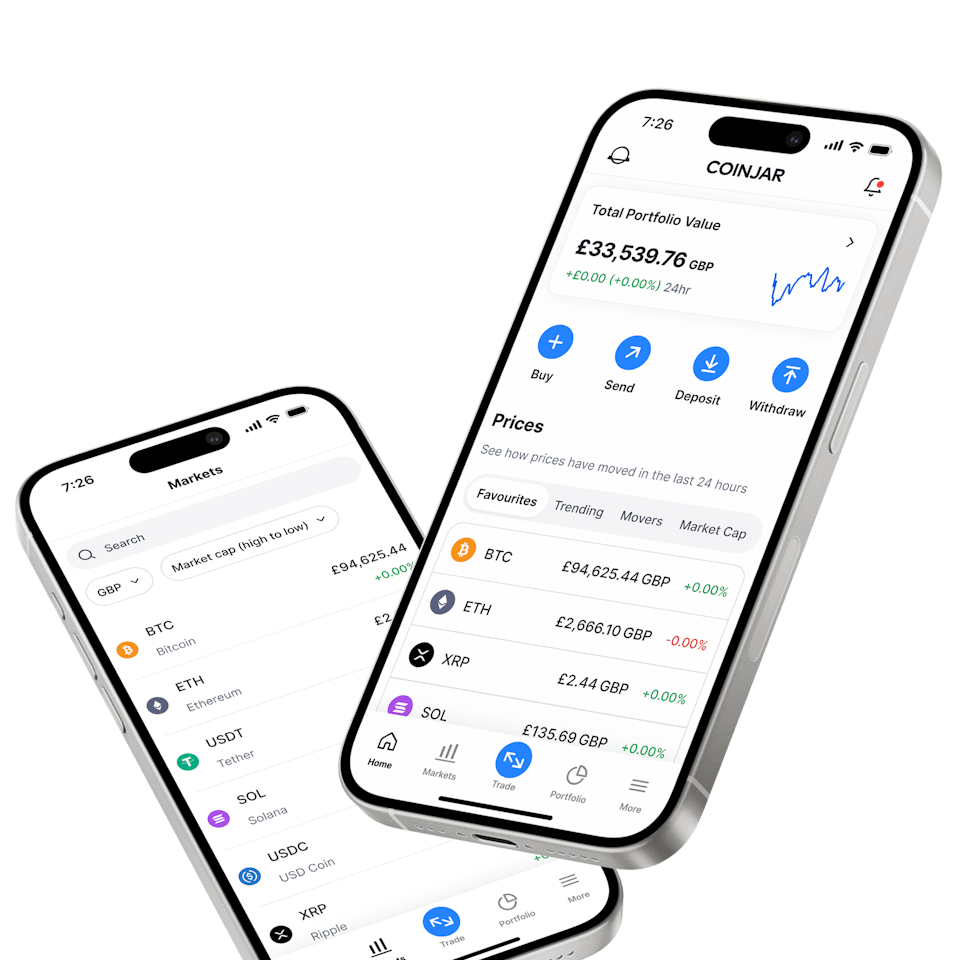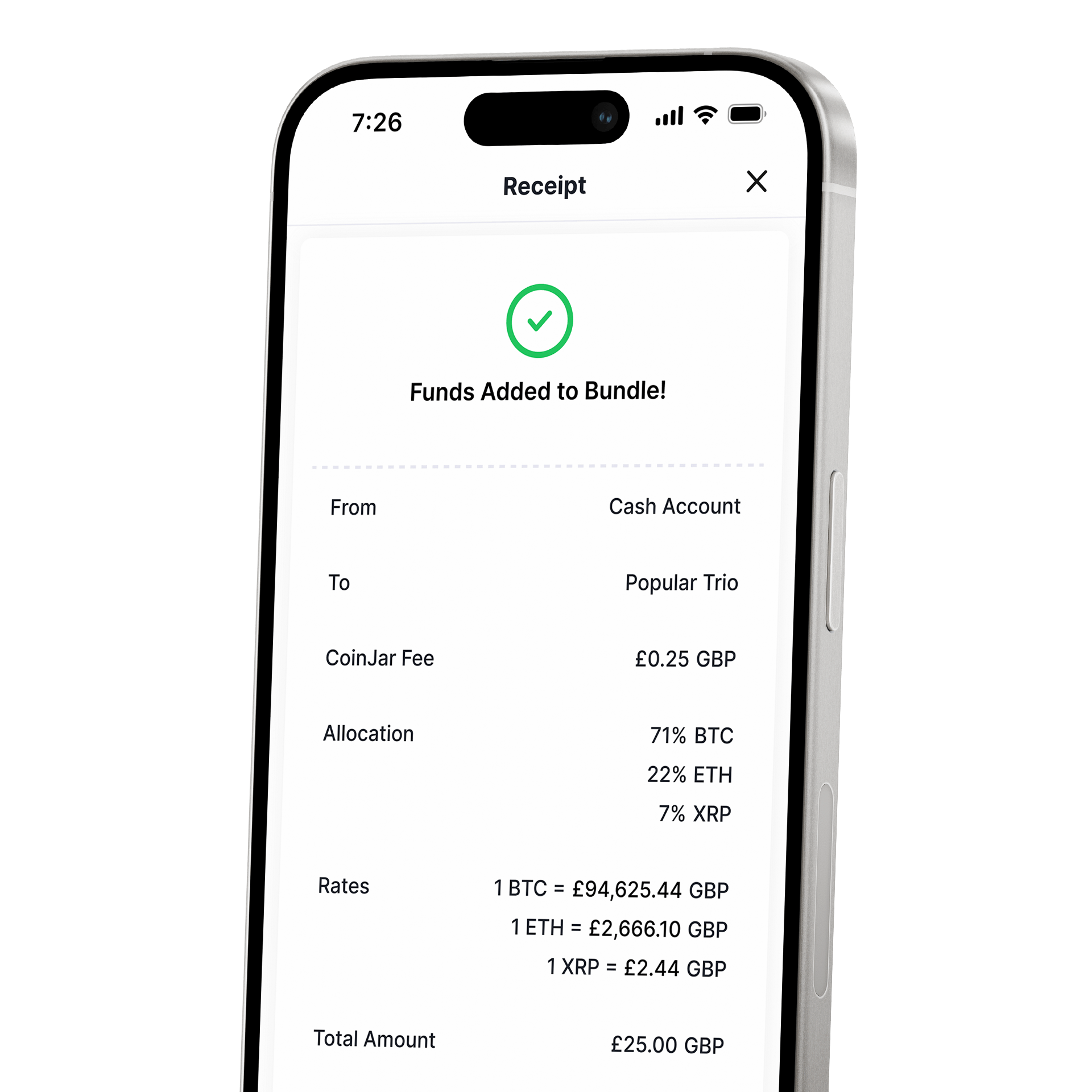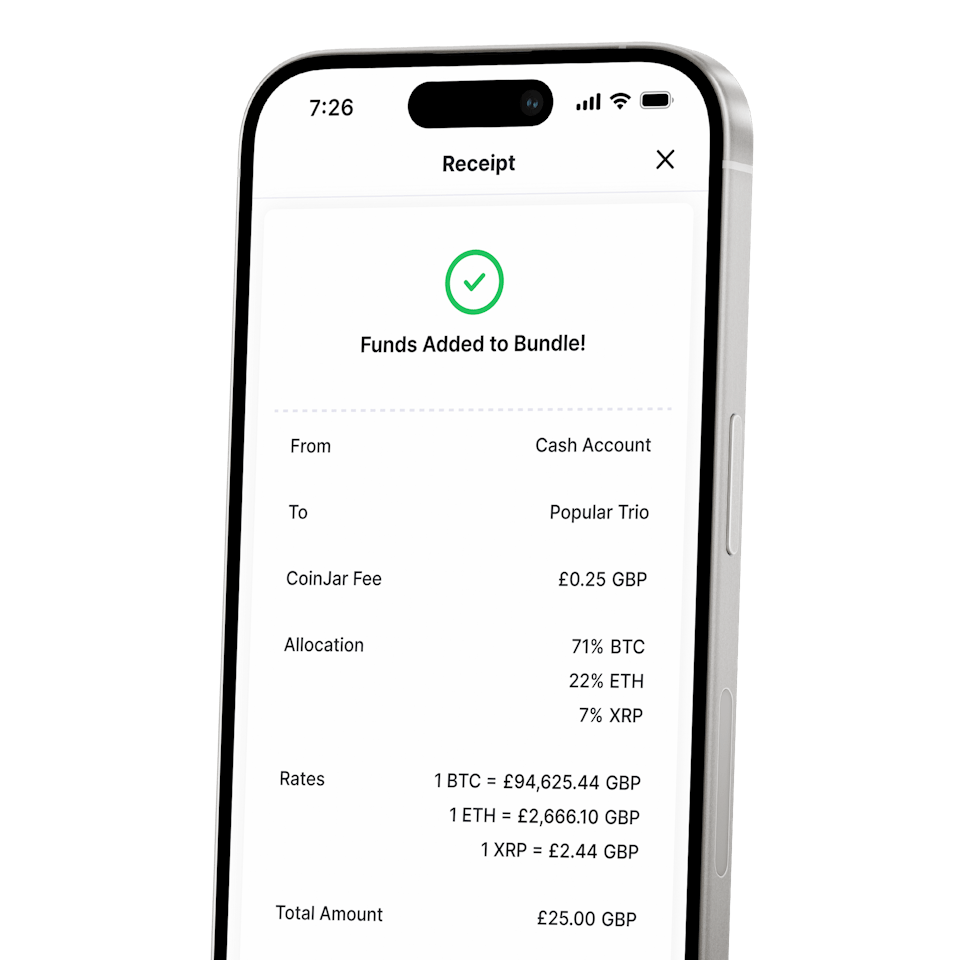Don’t invest unless you’re prepared to lose all the money you invest. This is a high‑risk investment and you should not expect to be protected if something goes wrong. Take 2 mins to learn more.
Buy Amp (AMP) in UK With GBP | CoinJar
Amp
AMP
Overview
What is Amp?
Buy Amp (AMP): Amp is a token that enables instant and competitive cost [crypto] (https://www.coinjar.com/uk/learn/what-is-crypto) payments. It powers the [Flexa Network] (https://flexa.network/), a payment provider designed to enable instant and low-cost cryptocurrency transactions and also facilitates traditional payments.
The Flexa Network allows businesses to accept [payment] (https://flexa.network/currencies) in a variety of ways including in cryptocurrencies. It’s like a bridge between traditional payment methods and digital assets.
Utility token
AMP is a type of cryptocurrency that serves a specific purpose within the Flexa ecosystem.
Flexa Network
The Flexa Network acts as a bridge between traditional payment methods (like credit cards) and digital assets (cryptocurrencies).
It allows businesses and consumers to make payments using cryptocurrencies like Bitcoin or Ethereum.
How does AMP work?
Imagine you’re buying a product online using AMP (Flexa’s native token). When you pay with AMP, an equivalent value of AMP tokens is temporarily locked up as collateral. The transaction is confirmed on the blockchain, and the AMP collateral is released.
Why do investors buy AMP?
Here are a few reasons why people buy AMP.
Instant settlements
AMP facilitates immediate settlement of payments. When you make a purchase using AMP, the transaction is confirmed quickly, allowing merchants to receive funds without delays.
Collateralisation
AMP acts as collateral for transactions. When you pay with AMP, it’s locked up as collateral until the transaction is confirmed.
Competitive transaction fees
The Flexa Network aims to minimise transaction fees. By using AMP, users can avoid uncompetitive fees associated with traditional payment methods.
How Does AMP Work?
Imagine you’re buying a cup of coffee using AMP.
The user initiates payment: They scan a QR code at the coffee shop to pay with AMP.
Collateralisation: The equivalent value of AMP tokens is locked up as collateral in a smart contract.
Transaction confirmation: The transaction is broadcast to the network. Validators confirm it, and the coffee shop receives the payment.
Unlocking collateral: Once confirmed, the AMP collateral is released, completing the transaction.








Cash, credit or crypto?
Buy Amp using Visa or Mastercard. Get cash in your account with Faster Payments Service (FPS). Convert crypto-to-crypto with a single click.How to buy Amp with CoinJar
Start your cryptocurrency portfolio with CoinJar by following these steps.
Finder Awards Winner 2023
CRYPTO TRADING - VALUEFinder Awards Winner 2023
CRYPTO TRADING - VALUE
Featured In


CoinJar App
All-in-one crypto walletCoinJar App
All-in-one crypto wallet

CoinJar Exchange
FOR PROFESSIONAL CRYPTO TRADERS
CoinJar Exchange
FOR PROFESSIONAL CRYPTO TRADERS
CoinJar DCA & Bundles
AUTOMATE & DIVERSIFY YOUR PORTFOLIOCoinJar DCA & Bundles
AUTOMATE & DIVERSIFY YOUR PORTFOLIO
Frequently asked questions
What is AMP Token?
AMP is an open-source digital collateral token built on the Ethereum blockchain. It serves as a utility token for collateralising asset transfers, offering instant and verifiable assurances for various value transfer activities.
How does AMP work?
AMP allows users to collateralise any type of asset by staking their tokens. These tokens act as verifiable collateral, securing transactions (in a financial manner) within the Flexa Network.
The system of collateral partitions ensures that tokens can be staked without moving wallet addresses, enhancing protection and efficiency.
Who created AMP?
AMP was developed by the Flexa Network, with close support from blockchain software company Consensys. The project was led by Tyler Spalding.
What are the key features of AMP?
24/7 Availability: AMP operates around the clock, enabling transactions at any time. Irreversibly protected transactions: Once confirmed, AMP transactions cannot be reversed.
Smart contracts: AMP leverages smart contracts as collateral managers.
Proof of stake (PoS) consensus: AMP uses PoS for network protection.
ERC-20 token: AMP adheres to the widely adopted ERC-20 standard.
Open source: The AMP codebase is open for scrutiny and contributions.
What is the circulating supply of AMP?
At the time of writing (May 2024) there are [42 billion] (https://coinmarketcap.com/currencies/amp/) AMP tokens (approximately 42% of the total supply) in circulation.
The maximum supply of AMP is 99,444,125,026 coins. AMP’s supply is fixed and non-inflationary, which helps reduce volatility and risk for users and merchants.
What asset-related use cases does AMP support?
AMP facilitates transactions for a wide variety of asset-related use cases, including digital and physical assets.
It provides value transfer assurances for instant payments, making it ideal for retail, remittances, and more.
How does AMP offer instant verifiable assurances?
When you use AMP, the collateral is instantly verified, ensuring a level of protection and efficient transactions.
The Flexa Network benefits from AMP’s collateralisation model.
What is the live price of AMP in the past 24 hours?
Please check the top of this page for live prices.
How does AMP support value transfer activities?
AMP supports a wide variety of use cases for collateralisation. It can be designated to collateralise any account, application, or transaction, providing a versatile solution for value transfer activities.
How do AMP smart contracts work?
Collateral managers, which are smart contracts, lock, release, and redirect collateral within token partitions as needed to facilitate value transfers. AMP networks can collateralise payment networks, enabling instant, fraud-free payments to merchants across digital payment networks.
How do collateral partitions work?
Collateral partitions can be designated to collateralise any account application, or even transaction, ensuring balances are directly verifiable on the Ethereum blockchain.
Standard Risk Warning: The above article is not to be read as investment, legal or tax advice and it takes no account of particular personal or market circumstances; all readers should seek independent investment advice before investing in cryptocurrencies.
The article is provided for general information and educational purposes only, no responsibility or liability is accepted for any errors of fact or omission expressed therein. Past performance is not a reliable indicator of future results.
We use third party banking, safekeeping and payment providers, and the failure of any of these providers could also lead to a loss of your assets. We recommend you obtain financial advice before making a decision to use your credit card to purchase cryptoassets or to invest in cryptoassets. Capital Gains Tax may be payable on profits.
CoinJar's digital currency exchange services are operated in the UK by CoinJar UK Limited (company number 8905988), registered by the Financial Conduct Authority as a Cryptoasset Exchange Provider and Custodian Wallet Provider in the United Kingdom under the Money Laundering, Terrorist Financing and Transfer of Funds (Information on the Payer) Regulations 2017, as amended (Firm Reference No. 928767). In the UK, it's legal to buy, hold, and trade crypto, however cryptocurrency is not regulated in the UK.
It's vital to understand that once your money is in the crypto ecosystem, there are no rules to protect it, unlike with regular investments. You should not expect to be protected if something goes wrong. So, if you make any crypto-related investments, you're unlikely to have recourse to the Financial Services Compensation Scheme (FSCS) or the Financial Ombudsman Service (FOS) if something goes wrong.
The performance of most cryptocurrency can be highly volatile, with their value dropping as quickly as it can rise. Past performance is not an indication of future results. Remember: Don't invest unless you're prepared to lose all the money you invest. This is a high-risk investment and you should not expect to be protected if something goes wrong. Take 2 mins to learn more at: https://www.coinjar.com/uk/risk-summary.
UK residents are required to complete an assessment to show they understand the risks associated with what crypto/investment they are about to buy, in accordance with local legislation. Additionally, they must wait for a 24-hour "cooling off" period, before their account is active, due to local regulations. If you use a credit card to buy cryptocurrency, you would be putting borrowed money at a risk of loss.
We recommend you obtain financial advice before making a decision to use your credit card to purchase cryptoassets or to invest in cryptoassets.
Specific risks associated with DeFi tokens Decentralised Finance (or 'DeFi') tokens (e.g. UNI, AAVE) are crypto-assets linked to financial applications and protocols built on decentralised blockchain technology. DeFi tokens carry the following risks:
Smart contract risk: DeFi relies heavily on smart contracts. Even a minor coding error or oversight can lead to a contract being exploited, potentially resulting in significant losses for DeFi tokens.
Regulatory risk: DeFi operates in a decentralised manner, often without intermediaries or financial crime controls. Regulatory bodies across jurisdictions might introduce new regulations impacting the use, value, or legality of certain DeFi protocols or assets.
Rug-pulls / Exit scams: Some DeFi projects might be launched by anonymous or pseudonymous teams, increasing the risk of "rug pulls" where developers abandon the project and withdraw funds, leaving investors with worthless tokens.
Data/oracle risk: DeFi protocols often rely on external data sources or 'oracles. Manipulation or inaccuracies in these data sources can lead to unintended financial outcomes within the protocols. Protocol complexity: The complexity of some DeFi protocols can make it difficult for average users to fully understand the mechanisms and associated risks.
Specific risks associated with meme coins:
'Meme coins' (e.g. DOGE, SHIB, PEPE) are crypto-assets whose value is driven primarily by community interest and online trends.
Meme coins carry the following risks:
Volatility risk: Meme coins can have extreme price volatility, often experiencing rapid and unpredictable price fluctuations within short periods. The value of meme coins can be influenced by social media trends, celebrity endorsements, and other factors unrelated to traditional investment fundamentals. Lack of utility: Meme coins often lack intrinsic value or utility, being primarily driven by community interest, online trends, and speculative trading.
Market manipulation: Meme coins may be susceptible to increased risk of market manipulation including 'pump-and-dump' schemes, where the price is artificially inflated followed by a sudden crash.
Lack of transparency: Meme coins may have limited available information about their development teams, goals, and financials. This lack of transparency can make it challenging to assess the credibility and potential of a meme coin accurately.
Emotional investing: Meme coins often garner strong emotional reactions from investors, leading to impulsive decisions. Emotional trading activity can amplify losses.
Specific risks associated with stablecoins:
There is a risk that any particular stablecoin may not hold their value as against any fiat currency; or may not hold their value as against any other asset. Stablecoins carry the following risks:
Depegging events: Depegging events may occur with stablecoins that fail to maintain adequate controls and risk mitigants. A depegging event is when the value of the stablecoin no longer matches the value of the underlying asset. This could result in a loss of some or all of your investment.
Counterparty risk: Counterparty risk arises when an asset is backed by collateral, involving a third party maintaining the collateral, which introduces risk if the party becomes insolvent or fails to maintain it.
Redemption risk: Redemption risk refers to the possibility that an asset's ability to be redeemed for underlying collateral may not be as anticipated during market fluctuations or operational issues.
Collateral risk: Collateral risk refers to the possibility of the collateral's value declining or becoming volatile, potentially impacting the asset's stability, particularly when it is another crypto-asset.
Exchange rate fluctuations: Stablecoins, often denominated in US Dollars, expose investors to fluctuations in the USD:GBP exchange rate. Algorithmic risk: Algorithm risk refers to the possibility of an asset's stability being compromised due to unexpected failure or behaviour of the underlying algorithm, potentially leading to loss of value.
CoinJar does not endorse the content of, and cannot guarantee or verify the safety of any third-party websites. Visit these websites at your own risk.
Your information is handled in accordance with CoinJar’s Privacy Policy.
Cryptoassets traded on CoinJar UK Limited are largely unregulated in the UK, and you are unable to access the Financial Service Compensation Scheme or the Financial Ombudsman Service.
We use third party banking, safekeeping and payment providers, and the failure of any of these providers could also lead to a loss of your assets.
We recommend you obtain financial advice before making a decision to use your credit card to purchase cryptoassets or to invest in cryptoassets. Capital Gains Tax may be payable on profits.
CoinJar’s digital currency exchange services are operated in the UK by CoinJar UK Limited (company number 8905988), registered by the Financial Conduct Authority as a Cryptoasset Exchange Provider and Custodian Wallet Provider in the United Kingdom under the Money Laundering, Terrorist Financing and Transfer of Funds (Information on the Payer) Regulations 2017, as amended (Firm Reference No. 928767).
Apple Pay and Apple Watch are trademarks of Apple Inc. Google Pay is a trademark of Google LLC.
This site is protected by reCAPTCHA and the Google Privacy Policy and Terms of Service apply.

